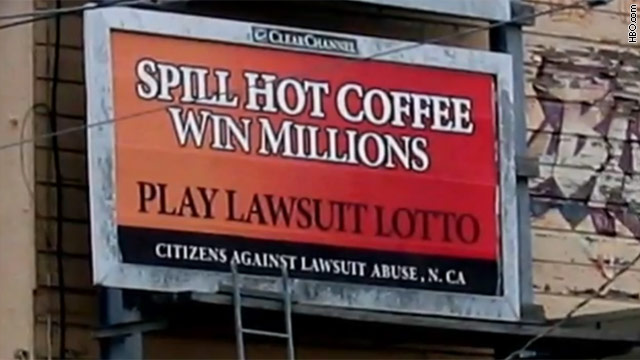
Answering today's OFF-SET questions is Susan Saladoff, former trial lawyer and producer/director of the film "Hot Coffee," which premieres Monday June 27, 2011 on HBO, as part of its Summer Documentary Series.

A graduate of Cornell University and George Washington University Law School, Saladoff practiced law in the civil justice system for 25 years, representing injured victims of individual and corporate negligence. She stopped practicing law in 2009 to make the documentary.
"Hot Coffee" was an official selection of the 2011 Sundance Film Festival–along with festivals in Los Angeles, Seattle and Boston among others.
It tells four stories to illustrate, according to the film's website, how big business interests have spent the last 30 years trying "to convince the public that we have out of control juries, too many frivolous lawsuits and a civil justice system that needs reforming. They have used anecdotes, half-truths and sometimes out and out lies in their efforts, for one purpose – to put limits on people’s access to the court system, the one and only place where an average citizen can go toe to toe with those with money and power and still have a shot at justice."
Let's begin with the first story in the film, Stella Lieback. On February 27, 1992, Liebeck ordered a cup of coffee from a drive-through window at a McDonald’s restaurant in Albuquerque, New Mexico. Liebeck, age 79, spilled the entire cup of scalding hot coffee on her lap. This case became the poster child for frivolous lawsuits. As you demonstrate, anyone you ask on the street believes she wasn't deserving of the large settlement she received after her case went to court.
Explain why you reached the conclusion that she wasn't taking advantage of McDonald's.
What most people don't know is how hot the coffee was and how severely Mrs. Liebeck was burned. McDonald's had a policy to serve the coffee between 180-190 degrees, which they knew no one could drink and would cause 3rd degree burns within 3-7 seconds of contact. They had paid out over 700 other people who had been burned by their coffee and refused to lower the temperature.
Mrs. Liebeck suffered third degree burns over 16% of her body, had to have skin taken from her thighs and sewn into her private parts, was hospitalized for 8 days and incapacitated for months more. She only asked for the difference between what Medicare paid and what her medical bills were and McDonald's never offered more than $800.
How did Mrs. Lieback become the butt of jokes in the national media, rather than a sympathetic character?
Despite the unanimous verdict for Mrs. Liebeck and even after the judge drastically reduced the amount awarded, McDonald's appealed and the parties settled out of court. As part of the settlement, Mrs. Liebeck was subject to a gag order (not so for McDonald's), so she could not defend herself when the media distorted the facts.
Even Jane Pauley, substituting for Tom Brokaw on the NBC Nightly News, reported the wrong facts. Most people believe she was driving the car, was not seriously injured and got millions. Of course, none of that is true. It was more fun for the media to perpetuate the myth and sensationalize the case to sell papers or get ratings than to report the accurate facts."
Let me ask about more character, Jamie Leigh Jones. She was allegedly raped by co-workers when she working in Iraq as a private contractor for KBR/Halliburton. Because of where the crime allegedly occurred, she couldn't file criminal charges. She sought to hold Halliburton accountable, but a forced arbitration clause in her employment agreement meant she lost her right to a jury trial. Her case is active at this moment, right?
Yes, she is the middle of a trial against Halliburton in Houston right now. The only reason she is now able to go to court, despite the forced arbitration clause in her employment contract, is because of an amendment to the Defense Appropriations Bill introduced by Senator Al Franken and called the Jamie Leigh Jones bill, which prevents the government from contracting with companies who force arbitration on employees in rape, assault, harassment, wrongful imprisonment and discrimination claims.
Halliburton dropped their appeal after the amendment passed in the Senate and, after almost 6 years, Jamie is finally able to seek justice in a court of law."
Please explain how forced arbitration clauses have an impact on millions of Americans.
We, as consumers, are signing contracts everyday that require us to give away our constitutional right to access the courts if we are wronged. We sign contracts for our cell phones, credit cards, mortgages, gym memberships and employment contracts, just to name a few. We can’t buy anything over the Internet without clicking “I accept” to the terms of the contract.
Who reads those agreements? Even if we did, who would understand the terms or care until something happens?
Yet many of these contracts have you “agree” to resolve any dispute through arbitration - where the company picks the decision maker, pays for the decision maker, the decision maker doesn’t have to give a reason for the decision, there is no right to appeal and it is completely secretive.
These arbitrations are often skewed in favor of the large corporate defendant and against the consumer because the arbitrators want to get rehired by the company who is picking and paying them."
President George W. Bush shows up a number of times in the documentary. Why was he constantly making speeches about the necessity of tort reform?
Tort reform, or limiting average citizen's access to the courts, became a central piece of the Rove/Bush strategy for fundraising. It was the one issue that could open the pocket books of corporations all over the country.
Bush was successful raising money using this issue when he was running for Governor inTexas, and then continued when he ran for President. What most people don't know if that Bush's chief advisor, Karl Rove was working for Philip Morris and Bush at the same time. The tobacco industry had an incentive to keep people out of the courts because they made a product that killed people and they didn't want to be held accountable."
The economy is still recovering, slowly. Companies are under pressure to create millions of jobs. What is wrong if American corporations want to protect themselves from people who think they can sue these companies and make a large amount of money?
It is myth that there are a ton of lawsuits against corporations. And even more of a myth that somehow lawsuits holding corporate wrongdoers accountable is harming our economy.
If a company like BP negligently spills billions of oil into the ocean and people lose their livelihood, don't we want to hold them accountable?"
How much power do ordinary citizens have to make sure they are not losing the rights they are entitled to?
The power we have is through our voices, our votes and by taking action to influence members of Congress.
We can correct people when they have the facts wrong. We can contact our state legislators and tell them to oppose laws that limit our legal rights.
As for arbitration clauses, in some cases we can try to cross the out or negotiate not to have them. And we can tell members of Congress to support the Arbitration Fairness Act that would provide limits on mandatory arbitration by corporations.


No comments:
Post a Comment